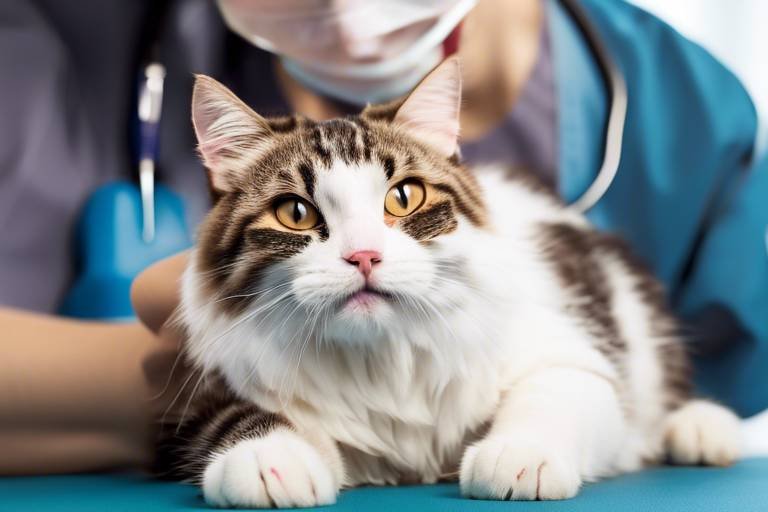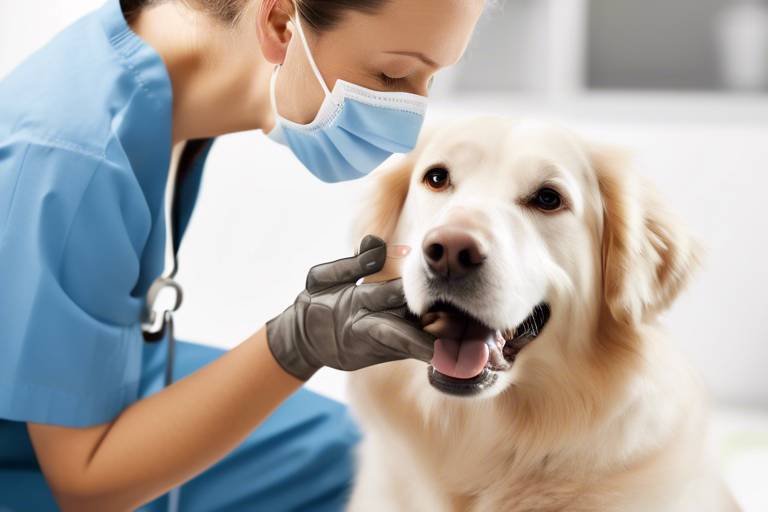The Benefits of Using Natural Remedies for Pets
When it comes to our furry friends, we all want the best for them, right? That's where natural remedies come into play. These holistic alternatives to conventional medicine can be a game-changer for your pet's health. Imagine a world where your pet's ailments are treated with the gentle touch of nature, rather than harsh chemicals. Sounds like a dream? Well, it's not! Natural remedies can be effective, safe, and easy to incorporate into your pet care routine. In this article, we’ll explore the myriad benefits of using natural treatments and how they can enhance your pet’s overall well-being.
One of the most appealing aspects of natural remedies is their holistic approach. Unlike conventional pharmaceuticals that often target specific symptoms, natural treatments aim to support the entire body. This means that rather than just masking a problem, these remedies can help your pet regain balance and health from the inside out. Plus, many pet owners find that natural remedies can be more cost-effective in the long run, as they often address the root cause of issues rather than just treating the symptoms.
Another significant benefit is the reduction in side effects. Traditional medications can sometimes come with a laundry list of adverse effects, which can be concerning for pet owners. With natural remedies, the risk of side effects is generally lower, making them a safer option for many pets. Imagine giving your dog a herbal tincture that not only alleviates their anxiety but also promotes a shiny coat and healthy digestion—sounds like a win-win, right?
Moreover, natural remedies often promote a stronger bond between you and your pet. When you take the time to research and understand what natural treatments can benefit your furry companion, it shows your dedication to their health. This commitment can foster trust and comfort, making your pet feel more secure in your care. Just like how we appreciate a homemade meal over fast food, pets too can sense the love and effort that goes into their natural treatments.
In addition to these benefits, natural remedies can also be tailored to suit individual needs. Whether your pet is dealing with chronic issues or just needs a little boost in their daily wellness routine, there are numerous options available. From herbal treatments for joint pain to essential oils for calming nerves, the possibilities are endless. It's like having a personalized health plan designed just for them!
However, it’s important to remember that while natural remedies can be incredibly beneficial, they are not a one-size-fits-all solution. Each pet is unique, and what works for one may not work for another. Therefore, it’s crucial to consult with a veterinarian who understands both conventional and alternative treatments. They can help guide you towards the best natural remedies for your pet's specific condition and needs.
- Are natural remedies safe for all pets? - While many natural remedies are safe, it's always best to consult with a veterinarian first, especially if your pet has existing health conditions.
- How do I know which natural remedy to choose? - Research is key! Look into the specific health issue your pet is facing and consult with your vet for tailored advice.
- Can I use human herbal remedies on my pets? - Not all human remedies are safe for pets. Always check with a vet before administering any treatment.
- How long does it take to see results from natural remedies? - Results can vary based on the remedy and the pet's condition, but many owners report improvements within a few weeks.

Understanding Natural Remedies
Natural remedies are a fascinating world that many pet owners are beginning to explore. They encompass a wide range of treatments derived from plants, minerals, and even certain animal products. These remedies offer a holistic alternative to conventional medicine, focusing on treating the root causes of ailments rather than just alleviating symptoms. Imagine the difference between treating a pesky cough with a quick fix versus addressing the underlying issue that caused it in the first place. That's the essence of natural remedies for our furry friends!
At their core, natural remedies aim to promote overall wellness and balance within the body. They can be particularly beneficial for pets suffering from chronic conditions or those that may not respond well to traditional pharmaceuticals. For instance, some pet owners have reported success using herbal treatments to manage anxiety or digestive issues in their pets. The beauty of these remedies lies in their diversity. They can range from simple herbal teas to more complex tinctures, each tailored to meet the unique needs of your pet.
So, what types of natural remedies are available? Here are a few categories that pet owners might find helpful:
- Herbal Remedies: These include various plants known for their healing properties, such as chamomile for calming effects or ginger for digestive support.
- Essential Oils: Extracted from plants, these oils can promote relaxation and wellness when used correctly.
- Homeopathic Treatments: These involve highly diluted substances aimed at triggering the body's natural healing response.
The appeal of natural remedies also lies in their perceived safety. Many pet owners are concerned about the side effects of conventional medications, which can sometimes be severe or lead to further complications. Natural remedies, on the other hand, are often viewed as gentler alternatives, with fewer side effects. However, it's crucial to remember that "natural" doesn't always mean "safe." Just like any other treatment, natural remedies require careful consideration and proper administration to ensure the well-being of your pet.
In essence, understanding natural remedies is about embracing a more holistic approach to pet care. It encourages pet owners to look beyond the conventional and explore the vast array of options that nature provides. Whether you're considering herbal treatments, essential oils, or homeopathy, the key is to stay informed and consult with professionals to find the best fit for your furry friend. As we delve deeper into this topic, you'll discover how these natural alternatives can enhance your pet's health and happiness.

Common Natural Remedies for Pets
When it comes to caring for our furry friends, many pet owners are turning to natural remedies as a way to promote health and well-being. These remedies can be a fantastic alternative to traditional pharmaceuticals, especially for common ailments. They often come from nature, harnessing the power of plants and minerals to help our pets feel their best. But what exactly are these remedies, and how can they benefit your pet?
Natural remedies can be broken down into several categories, with each offering unique benefits. Some of the most popular options include herbal treatments, essential oils, and homeopathy. Let's delve into each of these categories to understand how they can help our pets and what specific remedies are commonly used.
Herbal treatments have been used for centuries to address a variety of health issues in pets. For example, chamomile is known for its calming properties and can help soothe anxiety in dogs and cats. Similarly, ginger is often used to alleviate digestive issues, making it a great option for pets that suffer from upset stomachs. Another popular herb is milk thistle, which supports liver health and detoxification.
When administering herbal remedies, it’s essential to consider the correct dosage and method. Many herbs can be given in the form of teas, tinctures, or powders mixed into food. However, always consult with a veterinarian to ensure that the chosen herb is safe and appropriate for your pet's specific condition.
In recent years, essential oils have gained traction in the realm of pet care, thanks to their therapeutic properties. Oils like lavender and peppermint are often used to promote relaxation and relieve stress. They can also help repel insects, making them useful during the summer months. However, it's crucial to use essential oils with caution, as some can be toxic to pets.
When using essential oils, consider diffusing them in the air or diluting them with a carrier oil before applying them to your pet's skin. Always monitor your pet for any signs of discomfort or allergic reactions, and consult your veterinarian for guidance on safe usage.
Another gentle approach to treating pets is homeopathy. This method uses highly diluted substances to stimulate the body's natural healing processes. Homeopathic remedies can be effective for a range of conditions, from allergies to chronic pain. For instance, Arnica montana is frequently used for bruising and soreness, while Apis mellifica can help with swelling and insect bites.
Homeopathy is particularly appealing because it is non-invasive and typically has few side effects. However, it requires a good understanding of the specific remedy needed for your pet's condition. Consulting with a veterinarian who specializes in homeopathy can provide valuable insight and ensure that you choose the right treatment.
In summary, natural remedies like herbal treatments, essential oils, and homeopathy offer pet owners a variety of options for non-invasive care. These remedies not only address common ailments but also promote a holistic approach to health that can lead to improved well-being for our beloved pets. However, it’s essential to approach these remedies with care and always keep an open line of communication with your veterinarian.
Q: Are natural remedies safe for all pets?
A: While many natural remedies are safe, it's important to consult with your veterinarian before starting any treatment, as some pets may have allergies or specific health conditions that could be affected.
Q: How do I know which natural remedy to use for my pet's condition?
A: It's best to consult with a veterinarian who can provide guidance on the most appropriate natural remedies based on your pet's specific needs and health status.
Q: Can I use essential oils on my pet?
A: Yes, but caution is necessary. Always dilute essential oils and monitor your pet for any adverse reactions. Some oils can be toxic, so consult your veterinarian before use.
Q: How long does it take for natural remedies to work?
A: The time it takes for natural remedies to show effects can vary depending on the remedy and the condition being treated. It’s essential to be patient and consistent with treatment.
Herbal Treatments
When it comes to keeping our furry friends healthy, offer a fantastic alternative to traditional medicine. These natural remedies harness the power of plants to address various health issues that pets might face. Imagine your pet feeling better with the help of nature's pharmacy! From soothing digestive troubles to alleviating anxiety, herbs can be a game-changer in pet care.
Some of the most popular herbs for pets include chamomile, known for its calming properties, and ginger, which can help with nausea. Milk thistle is another powerhouse herb that supports liver health, making it a valuable addition to your pet's wellness routine. It's like having a holistic toolkit right in your kitchen! However, it's essential to know how to use these herbs safely and effectively.
Here’s a quick look at some common herbal treatments and their uses:
| Herb | Benefits | Administration |
|---|---|---|
| Chamomile | Calming, aids digestion | Tea infusion or capsules |
| Ginger | Supports digestion, reduces nausea | Fresh root or powdered form |
| Milk Thistle | Liver support, detoxification | Capsules or tinctures |
When introducing herbal treatments, start with small doses and observe your pet's response. It's like testing a new recipe; you want to ensure it’s just right! Always remember that not all herbs are safe for every pet, so do your homework before diving in. Consulting with a veterinarian who has experience with herbal medicine is crucial. They can guide you on the proper dosages and any potential interactions with other medications your pet may be taking.
Additionally, some pets may have allergies or sensitivities to certain herbs. Always keep an eye on your pet after administering a new treatment. If you notice any adverse reactions, such as vomiting or lethargy, discontinue use immediately and consult your vet. Think of it as being a responsible chef; you wouldn’t want to serve a dish that could make your guests sick!
In summary, herbal treatments can be a wonderful way to support your pet’s health naturally. With the right knowledge and precautions, you can tap into the healing power of plants and provide your furry companion with a holistic approach to wellness. So why not explore the world of herbal remedies and discover what nature has to offer?
- Are herbal treatments safe for all pets?
Not all herbs are safe for every pet. It's essential to consult with a veterinarian before starting any herbal treatment. - How do I know what dosage to give my pet?
The appropriate dosage can vary based on the herb and your pet's size. Always seek guidance from a vet. - Can I use human herbal supplements for my pet?
It's best to use products specifically formulated for pets, as human supplements may contain harmful ingredients. - What should I do if my pet has an adverse reaction?
If you notice any negative symptoms, stop using the herb immediately and contact your veterinarian.
Essential Oils
Essential oils have become a buzzword in the world of pet care, and for good reason! These concentrated extracts from plants possess remarkable therapeutic properties that can enhance your furry friend's well-being. Imagine walking through a lush forest and breathing in the invigorating scents of pine and lavender; that’s the essence of essential oils, bottled up and ready to work wonders for your pets. But before we dive into the specifics, it’s crucial to understand that not all essential oils are safe for every animal. Just like humans, pets can have unique sensitivities and reactions to different substances.
When used correctly, essential oils can provide a range of benefits for your pets, such as promoting relaxation, alleviating anxiety, and even aiding in the treatment of minor ailments. For instance, lavender oil is renowned for its calming effects, making it a fantastic choice for pets that experience stress during thunderstorms or fireworks. Similarly, peppermint oil can help with digestive issues and provide relief from nausea. However, it’s essential to remember that these oils should always be diluted before application and never applied directly to your pet’s skin without proper guidance.
Here are some popular essential oils that are generally considered safe for pets when used appropriately:
- Lavender Oil: Known for its calming properties.
- Chamomile Oil: Great for soothing skin irritations and promoting relaxation.
- Frankincense Oil: Can help with inflammation and support overall health.
- Peppermint Oil: Useful for digestive issues and providing a refreshing scent.
It's important to note that while essential oils can be beneficial, they should never replace conventional veterinary care. Always consult with your veterinarian before introducing any new treatment into your pet's care routine. They can provide valuable insights on which oils are best suited for your pet's specific needs and how to use them safely. Additionally, be cautious about the method of application; diffusing oils in the air can be a safe way to introduce the benefits without the risk of direct contact.
In summary, essential oils can be a fantastic addition to your pet care arsenal, offering natural support for various health issues. However, as with any treatment, knowledge is power. Understanding the properties of each oil and how they interact with your pet's unique biology is key to ensuring their safety and well-being. So, before you start creating your little pet spa at home, do your research and consult with your vet. Your furry friend will thank you for it!
1. Are all essential oils safe for pets?
No, not all essential oils are safe for pets. Some oils can be toxic to animals. Always consult your veterinarian before using any essential oils with your pets.
2. How should I apply essential oils to my pet?
Essential oils should be diluted before application and can be used in a diffuser or mixed with a carrier oil for topical use. Always ensure that your pet does not ingest any oils directly.
3. What are the signs of an adverse reaction to essential oils in pets?
Watch for signs like excessive drooling, vomiting, difficulty breathing, or changes in behavior. If you notice any of these symptoms, contact your veterinarian immediately.
4. Can I use essential oils around my pets if they are not directly applied?
Yes, diffusing essential oils in the air can be a safe way to enjoy their benefits without direct contact. However, ensure that the room is well-ventilated and your pet can leave the area if they choose.
5. How do I know which essential oils are best for my pet?
Consult with your veterinarian, who can guide you on which essential oils are safe and effective for your pet's specific health needs.
Homeopathy
This article explores the advantages of employing natural remedies for pet health, highlighting their effectiveness, safety, and holistic approach to care, along with practical tips for pet owners.
Natural remedies encompass various treatments derived from plants and minerals, offering a holistic alternative to conventional medicine. This section delves into the definition and types of natural remedies available for pets.
This section outlines popular natural remedies used for common pet ailments, including herbal treatments, essential oils, and homeopathy, providing pet owners with options for non-invasive care.
Herbal treatments can effectively address various health issues in pets. This subsection discusses specific herbs beneficial for pets, their uses, and how to administer them safely.
Essential oils are gaining popularity in pet care for their therapeutic properties. This part highlights safe essential oils for pets and their applications in promoting wellness and relaxation.
Homeopathy offers a gentle approach to treating pets, focusing on the principle of like cures like. This means that a substance that causes symptoms in a healthy animal can be used in very small doses to treat similar symptoms in a sick animal. Homeopathic remedies are made from natural substances and are highly diluted, making them safe for pets to use. For example, if a pet experiences anxiety during thunderstorms, a homeopathic remedy derived from a plant that induces similar feelings in humans can be beneficial.
One of the most appealing aspects of homeopathy is its customizability. Homeopathic treatments can be tailored to meet the specific needs of each pet, taking into account their unique symptoms, behavior, and overall health status. This personalized approach allows for a more effective treatment plan that considers not just the physical symptoms but also the emotional well-being of the pet.
Some common conditions that homeopathy can effectively treat in pets include:
- Allergies: Homeopathic remedies can help alleviate allergic reactions and improve skin health.
- Digestive Issues: Remedies can aid in treating upset stomach, diarrhea, and other gastrointestinal problems.
- Behavioral Problems: Homeopathy can address anxiety, phobias, and other behavioral issues in pets.
However, it’s crucial to remember that while homeopathy can be highly effective, it should not replace traditional veterinary care. Instead, it should be used as a complementary treatment. Always consult with a veterinarian experienced in homeopathy to ensure the best outcomes for your furry friends.
Natural remedies provide numerous benefits, including fewer side effects and improved overall health. This section discusses the advantages of choosing natural treatments over conventional pharmaceuticals for pets.
While natural remedies are generally safe, some precautions are necessary. This section emphasizes the importance of consulting with a veterinarian before starting any natural treatment for pets.
Engaging with a veterinarian ensures that pet owners choose appropriate natural remedies. This part discusses how to communicate effectively with vets about integrating natural treatments into pet care.
Understanding the potential risks associated with natural remedies is crucial for pet safety. This section outlines common pitfalls to avoid and how to monitor pets for adverse reactions.
Q1: Are homeopathic remedies safe for all pets?
A1: Yes, homeopathic remedies are generally safe for pets, but it’s essential to consult a veterinarian to ensure the right treatment is chosen for your pet's specific needs.
Q2: How long does it take for homeopathic remedies to work?
A2: The time frame can vary depending on the condition being treated and the individual pet. Some pets may show improvement within a few days, while others may take longer.
Q3: Can I use homeopathy alongside conventional treatments?
A3: Yes, homeopathy can complement conventional treatments. However, always consult your veterinarian before combining therapies.
Q4: Where can I find homeopathic remedies for pets?
A4: Homeopathic remedies can be found at health food stores, online retailers, or through holistic veterinarians.
Benefits of Natural Remedies
When it comes to caring for our beloved pets, the choice between natural remedies and conventional pharmaceuticals can be a tough one. However, many pet owners are increasingly leaning towards natural remedies due to their myriad of benefits. One of the most appealing aspects is the reduced risk of side effects. Unlike many over-the-counter medications, which can come with a laundry list of potential adverse reactions, natural treatments often boast a gentler profile. This means that your furry friend can receive effective care without the worry of harmful side effects that can sometimes accompany traditional drugs.
Additionally, natural remedies often promote a more holistic approach to health. They not only target specific ailments but also aim to enhance the overall well-being of your pet. For instance, many herbal treatments can support digestive health, boost the immune system, and even improve mental clarity and mood. It’s like feeding your pet a multi-vitamin that also helps them feel better in their daily lives! Just imagine your dog bounding around with renewed energy or your cat purring contentedly as they enjoy a more balanced state of health.
Moreover, the cost-effectiveness of natural remedies cannot be overlooked. While some veterinary treatments can be quite pricey, many natural alternatives are readily available and can be made at home or purchased at a fraction of the cost. For example, simple ingredients like ginger for nausea or chamomile for anxiety can be found in most kitchens or local health stores. This accessibility makes it easier for pet owners to provide care without breaking the bank.
Another significant advantage is the empowerment that comes with using natural remedies. Pet owners can take an active role in their pet's health by learning about various treatments and their applications. This knowledge fosters a deeper connection between pet and owner, as you become a more informed caregiver. Imagine the satisfaction of knowing you are providing your pet with the best possible care, tailored to their unique needs!
However, it's important to remember that not all natural remedies are suitable for every pet. Just like humans, pets can have individual sensitivities or allergies. Therefore, while exploring the world of natural treatments, it’s crucial to keep an eye on your pet’s reactions and consult with a veterinarian when in doubt. This ensures that your approach to natural remedies remains safe and effective.
In summary, the benefits of natural remedies for pets are numerous and compelling. With fewer side effects, a holistic approach to health, cost-effectiveness, and the empowerment of pet owners, it’s no wonder that more and more people are considering these alternatives. As you embark on this journey, you'll not only be enhancing your pet's quality of life but also creating a stronger bond through shared wellness.

Safety Considerations
When it comes to using natural remedies for our beloved pets, safety should always be at the forefront of our minds. While these remedies often come with fewer side effects compared to conventional medications, it’s essential to approach them with caution. Just because something is labeled as "natural" doesn't automatically mean it's safe for every pet. Each animal is unique, and what works wonders for one may not be suitable for another. Therefore, a proactive stance on safety is crucial.
Before introducing any natural treatment, it's imperative to consult with a veterinarian. Your vet can provide invaluable insights into which remedies are appropriate for your pet’s specific health condition, age, and breed. They can also help you avoid potential interactions with any medications your pet is currently taking. The conversation doesn't have to be intimidating; think of it as a collaborative effort to enhance your pet's well-being. Here are some key points to discuss with your vet:
- Current health conditions of your pet
- Any medications your pet is currently taking
- Specific natural remedies you are considering
Furthermore, it's important to recognize that not all natural substances are safe for pets. Some herbs and essential oils, while beneficial in certain contexts, can be toxic to animals. For example, tea tree oil is often praised for its antibacterial properties, but it can be harmful to dogs and cats if ingested or applied improperly. Always conduct thorough research and double-check with your veterinarian about the safety of any natural remedy you plan to use.
Monitoring your pet after introducing a new natural remedy is also crucial. Keep an eye out for any adverse reactions, which could range from mild symptoms like gastrointestinal upset to more severe issues such as allergic reactions. If you notice anything unusual, don't hesitate to contact your vet immediately. It's better to be safe than sorry when it comes to our furry friends.
In summary, while natural remedies can be a fantastic addition to your pet care routine, they should be approached with the same caution as any other treatment. By consulting with a veterinarian, understanding the potential risks, and closely monitoring your pet, you can create a safe and effective natural health regimen that supports their overall well-being.
Here are some common questions pet owners have regarding the use of natural remedies:
| Question | Answer |
|---|---|
| Are all natural remedies safe for pets? | No, not all natural remedies are safe. It's essential to consult with a veterinarian before using any natural treatment. |
| How do I know if a natural remedy is effective? | Effectiveness can vary. Monitoring your pet's response and consulting your vet can help determine if a remedy is working. |
| Can I use human natural remedies on my pets? | Many human remedies are not safe for pets. Always check with your vet before using any human products on animals. |
Consulting with a Veterinarian
When it comes to your furry friend’s health, is not just a good idea; it’s essential! Think of your vet as the captain of your pet's health journey, steering you through the sometimes murky waters of natural remedies. You wouldn’t set sail without a map, right? Similarly, before you dive into the world of natural treatments, having a chat with your vet can help you navigate the options that are safe and effective for your pet.
First off, it's crucial to communicate openly with your veterinarian about your interest in natural remedies. They can provide insights into which treatments might complement your pet's current health status and any medications they may be on. For instance, some herbs can interact with prescribed medications, leading to unwanted side effects. Your vet can help you avoid these pitfalls by offering tailored advice based on your pet's unique situation.
Moreover, it's important to remember that not all natural remedies are created equal. Some may have been studied extensively, while others might lack sufficient research. Your vet can guide you on the most reputable sources and products, ensuring that you choose remedies backed by science rather than just anecdotal evidence. This can be especially important when it comes to herbal treatments or essential oils, as the quality and concentration can vary widely between brands.
As you discuss your pet's health with your veterinarian, consider asking questions like:
- What natural remedies do you recommend for my pet's specific condition?
- Are there any potential side effects I should be aware of?
- How can I safely administer these remedies?
- What signs should I watch for that might indicate an adverse reaction?
In addition to asking questions, it’s also beneficial to keep a record of your pet’s health history, including any previous treatments and their outcomes. This information can be invaluable for your vet when considering the best course of action. Remember, your veterinarian's expertise is a vital resource in ensuring the well-being of your pet, especially when venturing into natural alternatives.
Ultimately, the goal is to create a balanced approach to your pet’s health. By combining conventional veterinary care with natural remedies, you can provide a holistic treatment plan that promotes overall wellness. So, don’t hesitate to reach out to your vet and explore the possibilities together—your pet deserves the best care possible!
- Can I use natural remedies alongside conventional medications?
Yes, but it is crucial to consult your veterinarian first to avoid any adverse interactions. - Are all natural remedies safe for pets?
No, some natural remedies can be harmful. Always check with your vet before trying something new. - How do I know if a natural remedy is effective?
Look for remedies supported by scientific studies and ask your vet for recommendations. - What should I do if my pet has an adverse reaction to a natural remedy?
Contact your veterinarian immediately for guidance on how to proceed.
Recognizing Potential Risks
When it comes to using natural remedies for our beloved pets, it's essential to tread carefully. While these remedies can offer numerous benefits, they are not without their risks. Just like with any treatment, there are potential pitfalls that pet owners should be aware of to ensure the safety and well-being of their furry friends. One of the primary concerns is that not all natural remedies are safe for every animal. For instance, certain herbs that are beneficial for dogs may be harmful to cats, and vice versa. This is why understanding the specific needs of your pet is crucial.
Moreover, the dosage of natural remedies can be tricky. What might be a safe amount for one pet could be too much for another, leading to adverse reactions. It's vital to consult with a veterinarian who is knowledgeable about both conventional and natural treatments. They can provide guidance on appropriate dosages and help you avoid any harmful interactions with other medications your pet may be taking.
Another risk to consider is the quality of the natural products you use. Not all natural remedies are created equal. Some may be poorly formulated or contaminated, which can pose additional risks to your pet's health. Always choose reputable brands and products that have been tested for safety and efficacy. Checking for third-party certifications can also give you peace of mind that you're using a quality product.
Additionally, while natural remedies can provide relief for many ailments, they are not a substitute for conventional veterinary care in serious situations. If your pet is experiencing severe symptoms, it's crucial to seek professional help rather than relying solely on natural treatments. Ignoring serious health issues in favor of home remedies can lead to worsening conditions and even life-threatening situations.
Lastly, always monitor your pet closely when introducing any new remedy. Look for signs of adverse reactions, such as changes in behavior, appetite, or energy levels. If you notice anything unusual, it's best to discontinue use and consult your veterinarian immediately. By being vigilant and informed, you can safely explore the world of natural remedies while keeping your pet's health a top priority.
- Are all natural remedies safe for pets? Not all natural remedies are safe for every type of pet. It's important to consult with a veterinarian to determine what is safe for your specific animal.
- Can I use human herbal supplements for my pet? No, many human supplements can be harmful to pets. Always choose products specifically formulated for animals.
- How can I tell if a natural remedy is working? Monitor your pet's symptoms and behavior closely. Improvement in their condition is a good indicator that the remedy may be effective.
- What should I do if my pet has an adverse reaction? If you notice any negative symptoms after administering a natural remedy, discontinue use immediately and contact your veterinarian.
Frequently Asked Questions
- What are natural remedies for pets?
Natural remedies for pets include treatments derived from plants and minerals that offer a holistic alternative to conventional medicine. These can range from herbal treatments to essential oils and homeopathy, providing various options for non-invasive care.
- Are natural remedies safe for my pet?
While many natural remedies are generally safe, it's crucial to consult with a veterinarian before starting any treatment. Some herbs and essential oils can be harmful if misused, so professional guidance ensures the safety and well-being of your pet.
- What are some common natural remedies for pet ailments?
Common natural remedies include herbal treatments like chamomile for calming, essential oils such as lavender for relaxation, and homeopathic solutions for various conditions. Each remedy can address specific health issues and promote overall wellness.
- How do I administer herbal treatments to my pet?
Herbal treatments can be administered in several ways, including teas, tinctures, or capsules. It's essential to follow dosage recommendations and consider your pet's size and health condition. Always start with small amounts to monitor for any adverse reactions.
- Can essential oils be harmful to pets?
Yes, some essential oils can be toxic to pets, especially cats. Oils like tea tree, eucalyptus, and citrus should be avoided. Always choose pet-safe oils and consult with a veterinarian before use to ensure your pet's safety.
- What should I discuss with my veterinarian regarding natural remedies?
When consulting your veterinarian, discuss the specific natural remedies you are considering, your pet's health history, and any symptoms they are experiencing. This open communication helps ensure that the chosen treatments are appropriate and safe.
- How can I recognize potential risks when using natural remedies?
It's important to monitor your pet for any unusual behavior or symptoms after introducing a new remedy. Signs of adverse reactions may include vomiting, diarrhea, or lethargy. If you notice any concerning changes, contact your veterinarian immediately.
- Are there any benefits to using natural remedies over conventional medicine?
Natural remedies often have fewer side effects and can improve overall health by supporting the body's natural healing processes. They also offer a holistic approach to pet care, focusing on wellness rather than just treating symptoms.



















